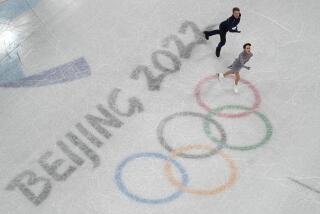U.S. track officials badly mishandle tiebreaker situation
EUGENE, Ore. — Bobby Kersee could not help but appreciate the irony Sunday as he watched Italy and England break a tie immediately with penalty kicks in their quarterfinal match at the European soccer championships.
That was happening while U.S. officials still were struggling to find a tiebreaker for third place in the women’s 100-meter final at the Olympic track and field trials — almost 20 hours after the race ended Saturday.
Even if the situation involving two athletes whom Kersee coaches is apparently unprecedented, the fact that officials never foresaw it, quickly botched it and dithered over resolving it seemed once again to underline the sad truth that the only amateurs left in Olympic sports are those who run them.
The delays left the sport open to suggestions there was an effort to ensure a resolution that would favor one of U.S. track’s stars, Allyson Felix, even if evidence shows that officials merely mishandled the matter.
The best way to decide whether Felix or Jeneba Tarmoh gets the final U.S. spot in the 100-meter field at the London Olympics is a runoff race. And that seems the likeliest outcome in a seat-of-the-pants scenario USA Track and Field announced Sunday evening.
The options are a runoff and a coin flip. The athletes will make that choice — unless one decides to decline the spot.
There will be a coin flip if both agree to it or both refuse to state a preference. Otherwise, it will be a runoff, probably July 1, the last day for both the trials and for resolving the issue.
Both can wait until the end of the 200 meters Saturday afternoon to decide which solution they prefer. That means Felix could exercise noblesse oblige and decline the spot if she makes the team in the 200 and Tarmoh doesn’t, since Felix’s Olympic medal chances in the 100 are minimal, and the 200 is her focus.
Got that?
And there is a further irony.
“You would think that after the fiasco involving me in 1984, there would be a procedure in place,” USA Track and Field President Stephanie Hightower said Sunday.
Hightower became the odd woman out after what looked like a four-way tie for first in the 100-meter hurdles at the 1984 Olympic trials. The winner was timed in 13.12, the next three in 13.13.
That took about 30 minutes to resolve.
Twenty-eight years later, officials determine times and finishes with cameras that shoot 3,000 frames per second and allow results to be split into thousandths of a second. When review of that evidence was complete an hour after the race Saturday, Felix and Tarmoh got times of 11.068, and it was impossible to separate their torsos — which determine finish — as they crossed the line.
The problem was unofficial times had showed Tarmoh one-thousandth ahead, and she took a lap of honor and talked to the media as a 2012 Olympian before that status was left uncertain. Meanwhile, Felix was disconsolate.
Both Felix and Tarmoh are scheduled to run the 200 beginning Thursday. Kersee said he does not want any decision about the 100 until after the 200.
Felix is a two-time Olympic silver medalist in the 200, and an individual-event gold has become her holy grail in a quest that has left tracks of her tears. Tarmoh made the world team in the distance last year. It may be hard for either to get the 100-meter uncertainty out of her mind in the 200, where the competition also is formidable.
No matter what happens, USATF honchos owe both runners — especially Tarmoh — an apology for putting them on an emotional roller coaster unnecessarily. And they owe their sport a procedure to cover such situations definitively and expeditiously.
More to Read
Get our high school sports newsletter
Prep Rally is devoted to the SoCal high school sports experience, bringing you scores, stories and a behind-the-scenes look at what makes prep sports so popular.
You may occasionally receive promotional content from the Los Angeles Times.






